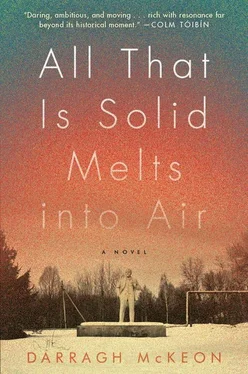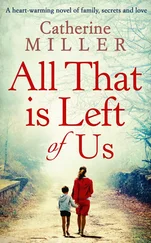But, they can’t afford such things, and he has laundry to deliver and she has a class to teach. And, besides, Alina would kill her.
They walk up the steps into the sunlight. The market is here, as always. Vegetables. Military wear. Resoled boots. Sunglasses for the November glare. You could probably get yourself some nuclear warheads here, if you had the money. There’s a container of figs with the lid off on one of the tables. It’s maybe ten years since she’s tasted one.
She moves on. She’ll buy something, an indulgence to make sure there’s no hard feelings. She’s said her piece. The boy has had quite an afternoon: it can’t be easy being a prodigy.
They stop at a blini stall and Yevgeni orders one with ham and egg and Maria says, “What? Everything I touch turns to gold? Come on now. Be reasonable.” And he smiles guiltily and orders one with red cabbage and sausage. Little runt, he knows the limits. The woman pours the mixture onto her round hot plate and then swirls it with the long, flat knife so it runs to the edge but doesn’t spill over.
Nearing the towers, the drunks have colonized the playgrounds, sitting on swings, glugging from bottles. One is lying flat on the merry-go-round, his head extending out one end, legs the other, a bottle of antifreeze lying on his chest, staring up at the photos of soldiers on the windows above him, memorials to family members who have died in service. All of them in their full dress, caps tilted high. The standard shots from academy graduation, faded with the weather. At night, when the lights are on, they cast a ghostly pallor over the place, giving a fleeting impression of stained glass. Maria knows that most of these soldiers were as stupid as tree trunks, fired up on their own testosterone, but she likes their glowing presence, a reminder that a home isn’t just comprised of furniture and electricity and plumbing. She understands why the babushkas can’t walk past one without blessing themselves.
Maria and Yevgeni climb the stairs—the lift is still out—and Maria turns the key and Yevgeni puts the greaseproof paper into the bin and lets out a belch.
“Don’t push it, Zhenya, just because your mother’s not here.”
“Sorry.”
“Wash your hands. We’ll get started. I’ll help you.”
His day is getting better.
It’s a Wednesday, which is the end of Alina’s laundry week, the day when the piles of freshly pressed sheets reach their peak, covering every available surface. Maria opens the door to the living room and steps into a tundra landscape. The place is so stark and pristine she can almost hear the Siberian winds whipping through the room.
Alina has pinned a tag on each stack with the owner’s name and address, and Maria begins to line up the piles in order of delivery. A stack has tipped over near the windowsill and Maria picks it up and shakes out the sheets for refolding. She hands two corners to Yevgeni, and they automatically go through the process. The ritual is not without its satisfactions. Maria loves the sensation of snapping the corners of a freshly dried sheet, yanking it between her and Yevgeni, the clean, sharp lines that emerge when they each pull tight, stepping forward and back, as though they were in the middle of a formal dance.
They pack up and start their deliveries in the falling snow.
They knock on doors in dimly lit passageways. Hand the bags over to people whose hands are dappled with liver spots, with raised veins. They smell smells they don’t want to think about, and hear rubbish flowing down the chutes around them set into the walls, arteries of waste running inside the building. They shoulder open doors of broken glass and doors where the glass has been replaced by wood or cardboard or not replaced at all, and with these ones, with the panels absent, they step through them, but first they place their hands forward, fingers splayed, feeling for what may or may not be there, like a blind man entering an unfamiliar room.
They go back to their apartment and restock and then head out once more, doing this systematically, building by building.
They walk up stairways with kids sprawled all over them. Kids not much older than Yevgeni, bottles of glue in front of them, and Maria doesn’t have to tell Yevgeni to be careful because the child already knows. How can he not, the synthetic leer on their faces?
They deliver a bag to a man with no hands, just bandaged stumps, and Maria walks inside and puts his laundry in the cupboard. The place is immaculately tidy and he explains that the woman next door comes over all the time to make sure he’s okay, and Maria feels good about this; it’s not all despair or spirit-stripping cynicism.
They see a birdcage that contains a cardboard bird, coloured in with crayon.
They see a red-candle waxwork of Lenin, burned down a little ways so that he looks as if he’s had a lobotomy.
They see a medical skeleton, standing in the corner of a room, wearing a broad-brimmed black felt hat.
Their last call is Valentina Savinkova, a friend whose husband works with Alina, and she doesn’t need to get her laundry done, but she wants to help out. Alina is a little embarrassed by her custom, but of course they’re not in a position to turn it down.
“You don’t need to have us do this.”
“Of course I do. I don’t want to be washing my sheets. Think of the time it saves me.”
“You have the time.”
“I have the time, but I don’t want to be wasting it on ironing, washing. It’s not charity, believe me. I let Varlam think it’s charity, otherwise he wouldn’t agree to it, but all that walking up and down to the basement. All those dull conversations I’d have to get into. Please”—she swats an open hand past her ear—“your sister is doing me the favour.”
She pours vodka into three glasses and Yevgeni laughs. She looks up.
“Zhenya, of course.” It’s her turn to laugh. “I have some kvass.”
She goes out and comes back in with a large glass, a handle on the side.
“Here. You can pretend it’s real beer.”
Yevgeni doesn’t much like kvass, but he drinks a slug and pats his tongue off the roof of his mouth, the tartness of the drink drawing his cheeks together.
Valentina looks around the room. “I should have cleaned.”
“You’ve just talked about how you couldn’t be bothered doing laundry and now you’re saying you should have cleaned.”
“What, you’re the KGB now? I’m contradicting myself? Fine. Is this a crime now too? You send this beautiful child over as a spy. Yes, you, Zhenya, you’re a beautiful child. I’d come over and mush your cheeks, but I’m drinking my vodka and you’d probably disappear into the couch in shame.”
Yevgeni doesn’t know how to respond to this.
“So why are you here too, Maria? Did you think your little spy needs some supervision?”
“No, just help. It’s a lot of work for a kid and I had an afternoon off.”
“An afternoon off? Sounds mysterious.”
“It’s not. I had a meeting at his school. Alina couldn’t make it.”
“And so you’re seeing what the child gets up to on his rounds, extorting food from vulnerable, lonely women.”
“I’m thinking maybe he shouldn’t be doing this alone. Those kids on the stairs.”
“I know. The corners are darker lately. I know.”
“It’s not a good place.”
“It’s fine. There’ll always be a few. It’s fine. It’s not like Zhenya will be getting caught up in all that. Besides, I hear you’re bound for the Conservatory, Zhenya.”
“Not exactly.”
“That’s not what I hear. All the practicing is going well?”
He’s silent. He doesn’t like it when adults get together and then include him. He’s just not one of them. Why pretend otherwise?
Читать дальше












